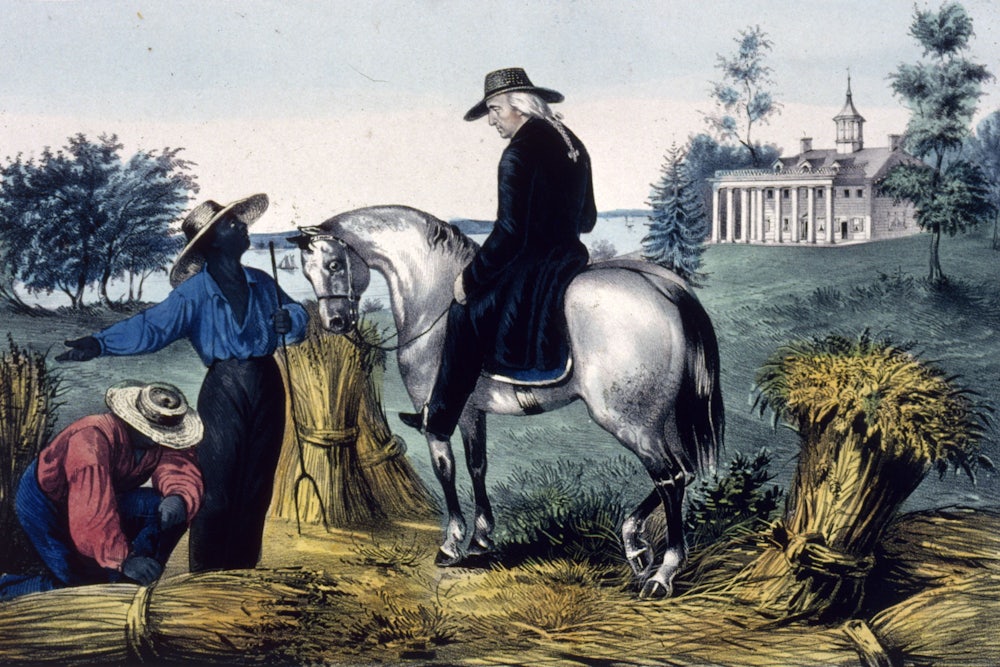Last month, Reuters published an investigation into how much of America’s political elite had ancestral ties to slaveholders. Its reporters found that “a fifth of the nation’s congressmen, living presidents, Supreme Court justices and governors are direct descendants of ancestors who enslaved Black people.” That includes more than a quarter of the U.S. Senate, two Supreme Court justices, and every living president except Donald Trump, whose German and Scottish ancestors emigrated to the United States after the Civil War.
Reuters said its report “reveals how intimately tied America remains to the institution of slavery.” For obvious reasons, few of the investigation’s subjects cooperated with it. That makes it even more impressive as a feat of genealogical research. By my count, the Reuters team would have had to scrutinize the family trees of nearly 600 people to reach its conclusions. Anyone who has taken up genealogy as a hobby knows how formidable and frustrating even a single tree can be.
Genealogical journalism is an increasingly common feature of political reporting. Some Americans have always been interested in tracing the family trees of the nation’s presidents or certain other famous people. But the wealth of online genealogical databases makes it easier than ever for the average citizen who knows where and how to look for such things. As an amateur genealogist myself, I am always thrilled to see this type of research become more accessible. As a journalist, I am a little more hesitant about the utility of some of these inquiries—and somewhat dubious about what lessons, if any, can be drawn from them.
Most genealogical research is done for personal reasons. But some genealogists also try to trace famous people’s family trees as well. Presidential ancestry has always drawn outsized curiosity from American researchers. Contemporary genealogists have often tried to find interesting tidbits about presidential candidates by researching their family history. This was a typically benign endeavor: One report during the 2004 election, for example, found that George W. Bush and John Kerry were sixteenth cousins, three times removed. Given that both men come from New England families with centuries-old roots in North America, it would have been more surprising if they weren’t distantly related.
Barack Obama’s ancestry drew even more curiosity during the 2008 presidential election for, well, obvious reasons. Again, some of it was good-natured. In 2008, the New England Historic Genealogical Society reported that Obama, through his mother, was related to multiple former presidents, including Bush. Obama himself joked on the campaign trail from time to time that he was distantly related to then–Vice President Dick Cheney. Riffing off of the candidate’s maternal Irish ancestry, one Irish band even released a viral folk song of sorts titled “There’s No One as Irish as Barack O’Bama.”
But some aspects took a more malign edge. Conservative media figures and some Republican officials falsely claimed that Obama was born in Kenya, not Hawaii, and was thus constitutionally ineligible to be president. The allegations were not based on any legitimate doubt about Obama’s status as a natural-born citizen, which was eventually confirmed by Hawaii’s vital records office. They instead reflected a desire to delegitimize the nation’s first Black president as not a “real” American. This “birther” conspiracy theory helped propel Donald Trump, one of its foremost proponents, to a leading role in the American far right and arguably to the White House itself in 2016.
In 2012, Massachusetts Senator Elizabeth Warren also became embroiled in a genealogical scandal when her claims of Native American ancestry came under scrutiny during her first campaign. Warren had long professed to be a Cherokee descendant based on family lore and had described herself as Native American on, among other things, her state bar application and in academic settings when working at Harvard University. Warren does not appear to have any documented Native American ancestors, but it is not uncommon for white American families to inaccurately claim distant (and often mythical) ones.
Native American genealogy is a complex subject, as my former colleague Nick Martin explained after Warren took a DNA test in 2019 that purportedly proved her Native American ancestry and then apologized for it. Tribal ancestry and membership is also far too nuanced a subject for the grinding partisanship of American political discourse: Warren took the test after Trump, who often referred to her derisively as “Pocahontas,” claimed he would donate $1 million to charity if she took it. (Unsurprisingly, he never paid up.)
Genealogical journalism can still be an important tool when scrutinizing political candidates’ backgrounds, especially when their professed identities are part of their campaigns. New York Representative George Santos, for example, reportedly invented most of his biography, including where he attended school, what companies he worked for, and even where he came from. The most damning revelation was that he had allegedly fabricated a story about having Jewish grandparents who fled Nazi-occupied Europe during World War II. That would be a particularly potent biographical detail in a New York congressional race. But the grandparents in question were from Brazil, and Santos appears to have no documented Jewish ancestry at all.
Not every genealogical inquiry into a public official’s background is all that illuminating. In February, The Washington Post published a lengthy investigation into Florida Representative Anna Paulina Luna, one of the House GOP’s newest members, and her ancestral background. The Post found that Luna’s “embrace of her Hispanic heritage [has] come as a surprise to some friends and family who knew her before her ascent to the U.S. House this year.” It also cast doubt on her claimed ties to the Jewish faith, spurring other publications to make Santos comparisons, and reported that her grandfather had served in the Wehrmacht during World War II.
How a person defines their own racial and ethnic identity can be complicated, and there is nothing in Luna’s background that can truly be described as fraud. Though she was born with the Germanic surname of Mayerhofer, Luna’s Hispanic ancestry is genuine on her maternal side. While she may have overstated her links to the Jewish faith, her father apparently did convert from Catholicism to Messianic Judaism, according to the Post’s own reporting. And it should go without saying that the fact of Luna’s grandfather having served in Nazi Germany’s military tells us nothing about his granddaughter and her beliefs.
This is not to say that the Post shouldn’t have published its investigation. But it is unsurprising that a half-white, half-Hispanic person wrestled with their ethnic identity while growing up or that she changed how she identified as a young adult. It is even less surprising given that Luna had an apparently difficult relationship with her father: He reportedly struggled with drug addiction and her parents never married one another. People are more than the sum of their parts, and how they identify with those parts isn’t always straightforward.
The Reuters investigation into slave-owning ancestors is far more equitable to those upon whom it reported. But there are definite limits to what its findings can actually tell us. As Reuters itself notes, there are no reliable estimates for how many living Americans have a slaveholding ancestor. This means there is no way to tell if they are overrepresented or underrepresented in the nation’s political institutions. The proportion of slaveholders at the Constitutional Convention in 1789 is probably far more relevant for American politics than the proportion of elected officials with slaveholding ancestry today.
In either event, the Reuters total is also almost certainly an undercount. In an explanation of its methodology, Reuters said that it only looked at evidence of slaveholding “that occurred after the founding of the United States.” Slavery existed throughout the Thirteen Colonies prior to 1776 and many of those states did not abolish it until the early nineteenth century. Someone without any documented Southern ancestors might still have a slaveholding forebear in their family if someone in their family tree lived in a pre-emancipation Northern state.
Some of these connections are also quite remote. Illinois Senator Tammy Duckworth, for example, had a fifth great-grandfather who lived in antebellum Virginia and owned at least four enslaved people. When one of Oklahoma Senator James Lankford’s fifth great-grandfathers died in Tennessee in 1827, he bequeathed at least two enslaved people to his descendants. A fifth great-grandfather is a person’s great-great-great-great-great-grandfather. (Genealogists understandably omit all of the “greats” after the first one for clarity’s sake.) Assuming there are no overlapping ancestors, the average person would have 128 fifth great-grandparents.
I raise this point not to diminish that ancestral link, but to contextualize it. Most people probably cannot name any of their fifth great-grandparents; even fewer people own something that once belonged to such an ancestor. And while slaveholders and their families certainly accrued generational wealth, one did not need to actually own enslaved people to reap the rewards of unfree labor. Focusing on the distant descendants of individual slaveholders ignores the Northern industrialists and creditors who also grew wealthy from the uncompensated blood and sweat of others.
The investigation itself shows, by virtue of sweeping up Democrats and Republicans alike, that the presence of a slaveholding ancestor does not predict anyone’s own political beliefs or personal morality. After all, Donald Trump is the only living former president without one and he is not exactly an icon of racial justice. I am also skeptical that this proves anything about the nation’s presidents, judges, and lawmakers beyond the obvious fact that slavery is an enduring feature of this country’s history.
The sole exception is somewhat counterintuitive: A Reuters/Ipsos poll conducted for the investigation found that white Americans who know they have slaveholding ancestors are nearly twice as likely to support government reparations for slavery as those who don’t have such knowledge, a trend that holds true for Democrats and Republicans alike. That factoid may be more salient if reparations becomes a national political issue in the future, but for now it is not.
Another tragic reality, one that goes virtually unmentioned in the Reuters investigation, is that a significant number of Black Americans are also the descendants of slaveholders. In the antebellum debates over the practice, abolitionists often cited sexual abuse against enslaved people by owners and overseers. This phenomenon became more widely known in contemporary times starting in the 1990s after researchers proved that Thomas Jefferson fathered children with Sally Hemings, whom he had owned as property. In a 2020 New York Times op-ed, poet Caroline Randall Williams powerfully described her undocumented but indisputable white ancestry in the context of the Confederate monument debate.
“According to the rule of hypodescent (the social and legal practice of assigning a genetically mixed-race person to the race with less social power) I am the daughter of two black people, the granddaughter of four black people, the great-granddaughter of eight black people,” Williams wrote. “Go back one more generation and it gets less straightforward, and more sinister. As far as family history has always told, and as modern DNA testing has allowed me to confirm, I am the descendant of black women who were domestic servants and white men who raped their help.”
There are inescapable dangers in drawing any conclusions or assumptions about someone’s descent from slaveholders. We do not choose our ancestors; sometimes our ancestors did not even choose us. I get uneasy, for example, when I see genealogical journalism that goes out of its way to highlight that Justice Ketanji Brown Jackson, the court’s first Black woman justice, is a descendant of enslaved people and that her white husband had slaveholding ancestors. The same could likely be said for many interracial marriages. What might be interesting from a genealogical perspective is not always important or relevant from a journalistic one.
Threading that needle will become more important as genealogical journalism gets easier and easier to perform. Until recently, researching your family’s history was a difficult and time-consuming hobby. Would-be researchers had to pore over census forms, probate records, newspaper clippings, and more—often only after traveling to libraries and specialized research centers. More often than not, they would have to correspond with dozens or hundreds of county and state officials by mail or travel to meet them in person. It would take months or even years to prove a hypothesis or break through a genealogical brick wall. As with so many other hobbies, the internet changed everything.
Americans who are interested in genealogy also owe a tremendous debt to the Church of Jesus Christ of Latter-day Saints. One of their tenets is baptism of the dead, in which a member of the church can obtain a baptism by proxy for a deceased person who never had the opportunity to get one. This practice led Mormons to devote extensive resources to family-history research, including gathering and digitizing countless records from across the U.S. and the world. Researching someone’s family history can now be as simple as checking a service like FamilySearch or Ancestry.com.
Journalism and genealogy draw upon many of the same skills: searching through public records, pursuing tenuous leads, weighing the reliability of sources, double-checking the accuracy of what you’ve found. They have the same basic goal: answering questions and finding the truth. But they also work in two fundamentally different ways. For a genealogist, almost every scrap of information is worth documenting because it could answer future questions or solve future mysteries. Journalists, on the other hand, only report what’s in the public interest. That can be a fairly broad category, but it is not unlimited.
The best genealogical journalism will try to answer specific questions of public relevance. Is Senator X telling the truth about their background? How does Governor Y’s family history affect their approach to Policy Z? How have the descendants of A, B, and C shaped the nation’s history? There is immense value in knowing where we come from. I have personally gained a far deeper understanding of American history since taking up genealogy than I did from any of my formal education. But there are also risks in drawing too many conclusions from it—or drawing the wrong ones.










